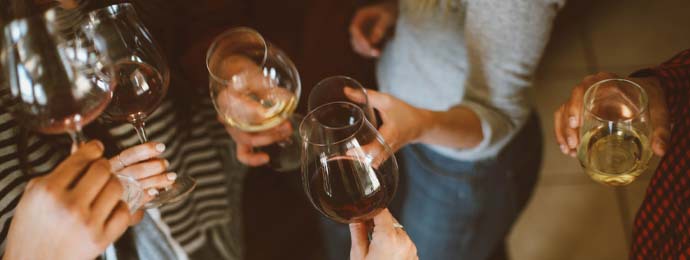Drink Driving: How long should you wait before getting behind the wheel?
Drink driving is dangerous and illegal every day of the year, however, during festive periods, such as Christmas and New Year, many drivers become complacent of limits and risk being over the legal drink-driving limit.
A Freedom of Information request from 42 police forces across the UK revealed in 2019 that there were over 3,507 driving under the influence offences in December alone that year in the UK - that is around 113 incidents a day!

But what exactly are the drink driving limits and how long should you wait after drinking to drive? Car leasing experts, Nationwide Vehicle Contracts, explain how to stay safe on the road after drinking, the penalties for drink-driving and what to do if you suspect someone of drink-driving.
How long should I wait after drinking to drive?
The law states that in England, Wales and Northern Ireland, the alcohol limit for drivers is:
- 80mg of alcohol per 100ml of blood,
- 35mcg per 100ml of breath,
- Or, 107mg per 100ml of urine
Scotland’s limit has differed to the rest of the UK since 2014. Like most of Europe, the limit north of the border is 50mg of alcohol per 100ml of blood, 22mcg of alcohol per 100ml of breath, and 67mg per 100ml of urine. Significantly less than the rest of the UK.
It is important to be aware that reaching this limit is different for everyone. Weight, age, sex and metabolism, whether someone has eaten prior to drinking, the type of alcohol being consumed, even stress levels at the time can impact how much alcohol the body absorbs.
As a general rule, the average adult takes about an hour to process one unit of alcohol.
There is nothing that can be done to speed this up. For example:
Alcohol | Average amount of hours to process |
|---|---|
Pint of beer/lager/cider | 2.3 hours |
Glass of wine | 2.3 hours |
Glass of prosecco | 1.5 hours |
Single shot of spirits | 1 hour |
Double shot of spirits | 2 hours |
*Source: Alcohol Change UK. Prosecco figures from Drink Aware.
The alcohol from one bottle of wine would take 11 hours from when someone has stopped drinking to leave the bloodstream before it is safe to drive. This means going to sleep will not help and could see some thinking they are capable of driving when there is still too much alcohol in their system.
“Whether you’re having ‘just the one’ or more than a few tipples, drinking alcohol can skew your judgement. Many people often think they are fine to drive themselves home when they are not - whether that is the night of the event, or even the morning after.”

What are the penalties for drink-driving?
Drink driving is a very serious criminal offence and motorists can be fined, banned from driving and even face jail depending on the seriousness of the offence.
That means if a person has one too many and decides to get behind the wheel inebriated and attempts to drive they could find themselves with six months’ imprisonment, an unlimited fine and a driving ban for a minimum of a year.
Drivers don’t have to be caught swerving on the road to a fine - a motorist could be caught sitting or sleeping intoxicated in a car with keys in the ignition to receive a £2,500 fine, up to 3 months in prison and a possible driving ban.
If a driver causes a death by careless driving when intoxicated they can face 14 years in prison, an unlimited fine, a ban from driving for at least 2 years and an extended driving test before their licence is returned.
Find out more about the drink driving penalties.
How to spot a drink-driver and what to do
The UK Government reports around 5% of all road traffic accidents are caused by drunk drivers. To protect yourself whilst on the road from those drunk driving, here is advice on how to spot a drunk driver.
- They are weaving and swerving over the road
- Driving at night without headlights
- Making illegal or abrupt turns
- Driving in the wrong lane or into oncoming traffic
These signs might not always mean the driver is under the influence, however, if you do notice any of these tell-tale signs, it is best to safely keep your distance on the road.
“Driving when under the influence of alcohol can affect your perception, concentration and reactions when on the road. This is extremely dangerous and puts yourself and other road users at risk. Many overlook how long alcohol can stay in your system, so it is important to make drivers aware of this.”

How to stop yourself and others from drink driving
If you plan to drive it is advised to stay away from drinking alcohol. However, if you can’t resist raising a drink, make sure to eat a full meal before drinking and opt for lower strength drinks, smaller measures, non-alcoholic drinks, or alcohol-free alternatives to pace yourself. Check the alcohol content of your drinks and stop drinking well before the end of the night to give your body enough time to process and eliminate any alcohol in your system.
Here are three tips on how to stop yourself and others from drink driving:
- Organise a designated driver between you that is not drinking alcohol
- Book a taxi in advance for yourself and others if you know you are likely to be drinking
- Avoid getting behind the wheel and opt for public transport with friends
Be careful when trying to talk strangers out of driving when intoxicated. People can become violent in this situation, so only do so if you think it is safe. If you are in a public establishment and worry someone is going to attempt to drive whilst drunk, alert the security or staff, or call 999.
Guide Information
Originally published: 11th August 2022
Last updated: 11th August 2022
